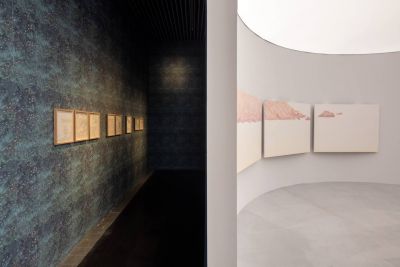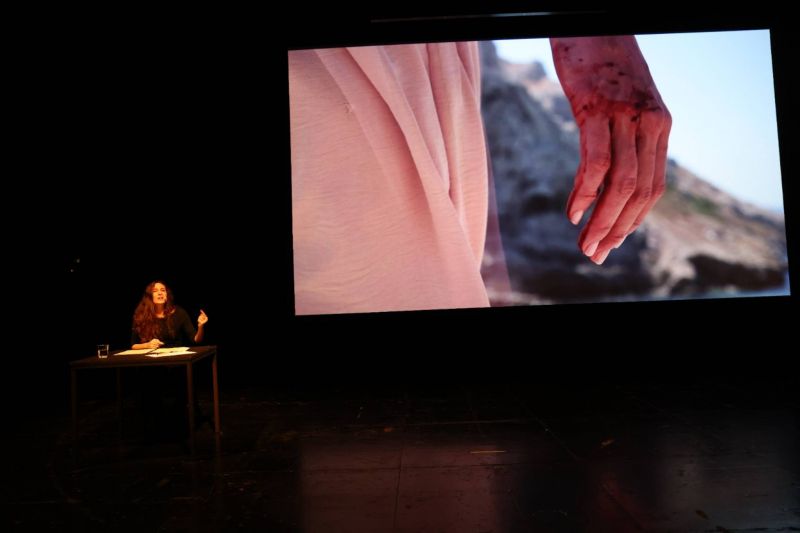
A still from the world premiere of "Secrets of the Infinite Sea," Nov. 16, 2022, at Theater Bremen. (Credit: Jörg Landsberg)
BEIRUT — “Law is just fascinating,” declares Lily Abichahine. “It intersects with policy, styles of government … From the shelves in a supermarket I can know who paid what and how. You can see if it’s an exclusive deal or shared among many brands. You see the world from a different perspective.”
There’s no shortage of stories about people who begin their adult lives in some solid, remunerative profession only to leave home and veer into the seldom-lucrative arts. Having devoted a decade to international and corporate law in Lebanon and France, Abichahine returned to school, earning a master’s degree in performing arts from Paris VIII in 2019. Her career arc seems unique from other career-swerving creatives in that she still straddles both worlds.
The timing of her career change, in the midst of the COVID-19 pandemic, implicates Abichahine in The Great Resignation — which since 2021 has seen record numbers of people leave their work due to immense job dissatisfaction, wage stagnation and the like.
“I think we never stop being lawyers,” she demurs. “I was practicing daily, as a job, until a year ago. I can continue taking on consultancies and working — I hope I can, anyway, because that’s the only way I have to make a living.”
Abichahine recollects how an advocacy job she’d been working on was winding down just as the text of her first performance piece, 2021’s “Exquisite Corpse,” was nearing completion.
“The job ending. Corona time. 2020. Financial crisis. We didn’t know anything,” she recalls. “We were just trying to understand where we’re heading … I decided to take some time to write. Weirdly my project proposal was accepted and when we showed it at a festival it was well received.
“I think I took pleasure in the process. I said, ‘Okay, we should give this a chance.’ We only live once. Let’s see how it goes.”
Abichahine is still going. She ventured into plastic arts with her installation I was destroyed by a mall thrice, staged as part of “Allo, Beirut?” a group show that opened at Beirut Beirut in 2021. Most of her work, generated and staged during various European residencies, has been performance, and she’s currently in the midst of a four-part series titled “Mare Nostrum” (Our Sea).
Abichahine sat with L’Orient Today as she was preparing “Secrets of the Infinite Sea,” the second installment of “Mare Nostrum,” being staged Wednesday at the American University of Beirut and Thursday at Marfa’ Projects.
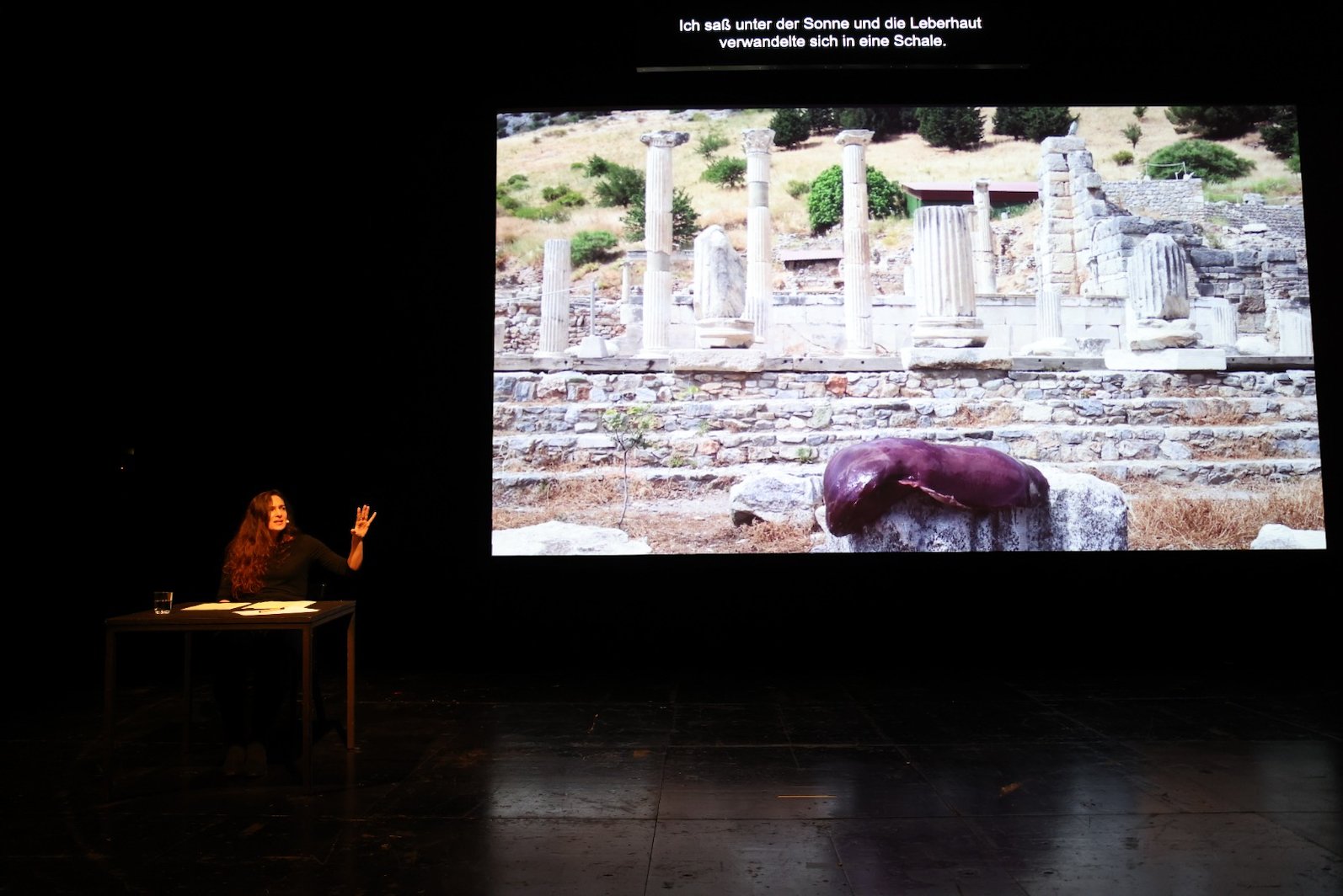 A still from the world premiere of "Secrets of the Infinite Sea," Nov.16, 2022, at Theater Bremen. (Credit: Jörg Landsberg)
A still from the world premiere of "Secrets of the Infinite Sea," Nov.16, 2022, at Theater Bremen. (Credit: Jörg Landsberg)
Fire, stolen
“Mare Nostrum” is premised, in part, on contrasting the political segmentation of the Mediterranean littoral today with its past unity.
“Mare Nostrum was the first political denomination for the Mediterranean basin,” Abichahine says. “This term is very legal, in a way: The Romans technically governed the entire coast and laws were unified. I talk about the Roman sea but also the Greek sea, the Ottoman sea.
“When we talk about MENA or Middle East, Europe, Asia, Africa, European, non-European, Schengen non-Schengen, global south, global north in the context of these periods of unity — these divisions become recent, questionable, challengeable.”
Each of the four parts of “Mare Nostrum” is a deep dive into the historical and imagined relationships binding pairs of Mediterranean cities, interpreted through Abichahine’s contemporary readings of ancient Greek myths — tales of figures punished by the gods.
“In myth,” she muses, “you find some of the rudimentary basis of law.”
The first installment, “Choreography for a Woman and a Stone,” takes up stories of Beirut and Palermo as read in the myth of Sisyphus. That figure is usually remembered as the king who, having cleverly evaded death twice, endures an afterlife tormented by the task of pushing a boulder up a hill only to watch it roll back down just shy of the top.
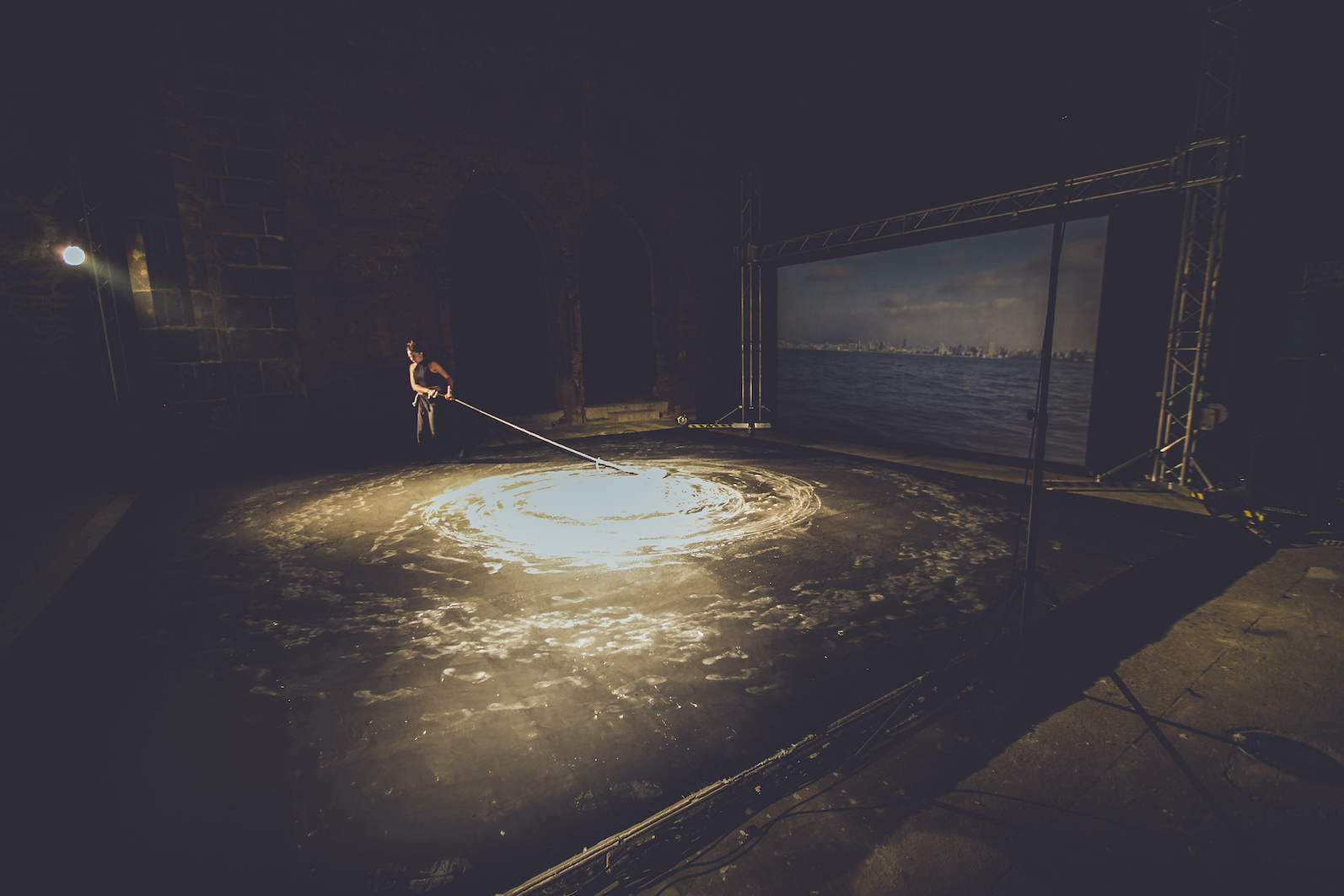 A still from "Choreography For a Woman and a Stone," Oct 21, 2021, at Santa Maria Lo Spasimo, Palermo, Italy. (Credit: @Vicenzo Allotta)
A still from "Choreography For a Woman and a Stone," Oct 21, 2021, at Santa Maria Lo Spasimo, Palermo, Italy. (Credit: @Vicenzo Allotta)
In her performance, Abichahine assumes the role of Sisyphus. Poised before a video screen, bound to a stone, she plies a tight circuit upon the stage’s black surface, leaving traces of the stone’s white residue in her wake, a primal chalk drawing.
“Secrets of the Infinite Sea” returns to the non-academic lecture-performance format she first explored in “Exquisite Corpse.” Debuting in Beirut at Mina Image Center in February, the work is interested in the mythic relationship of Izmir (formerly Smyrna) and Marseille. Their story is read through the lens of Abichahine’s reinterpreted myth of Prometheus, punished by the gods for stealing fire — variously interpreted as technology, civilization, etc. — and giving it to humans.
“I try to deconstruct a myth’s elements, then reconstruct it again to give it a contemporary meaning. First I worked on Sisyphus. Then Prometheus. Now I’m on Tantalus.” Another king punished for defying the gods, Tantalus’ name is the source of the English word “tantalize.” Abichahine asks, “If I have to [conjure up] this myth today, how and whom and what are its elements? Where would it happen? Who are these heroes?”
Abichahine paired Izmir and Marseille because, like Prometheus, they share a relationship with fire, but at the root of the city’s relationship, she says, is a happy refugee story.
“Izmir founded Marseille,” she says. “Fishermen leave Phocaea, this little port [on the Anatolian coast], and find an empty plot of land with some tribes living on it. The head fisherman falls in love with the daughter of one of the tribal leaders. She chooses him as her husband and Massalia/Marseille was born. Myth or reality, for me, this is a nice story.
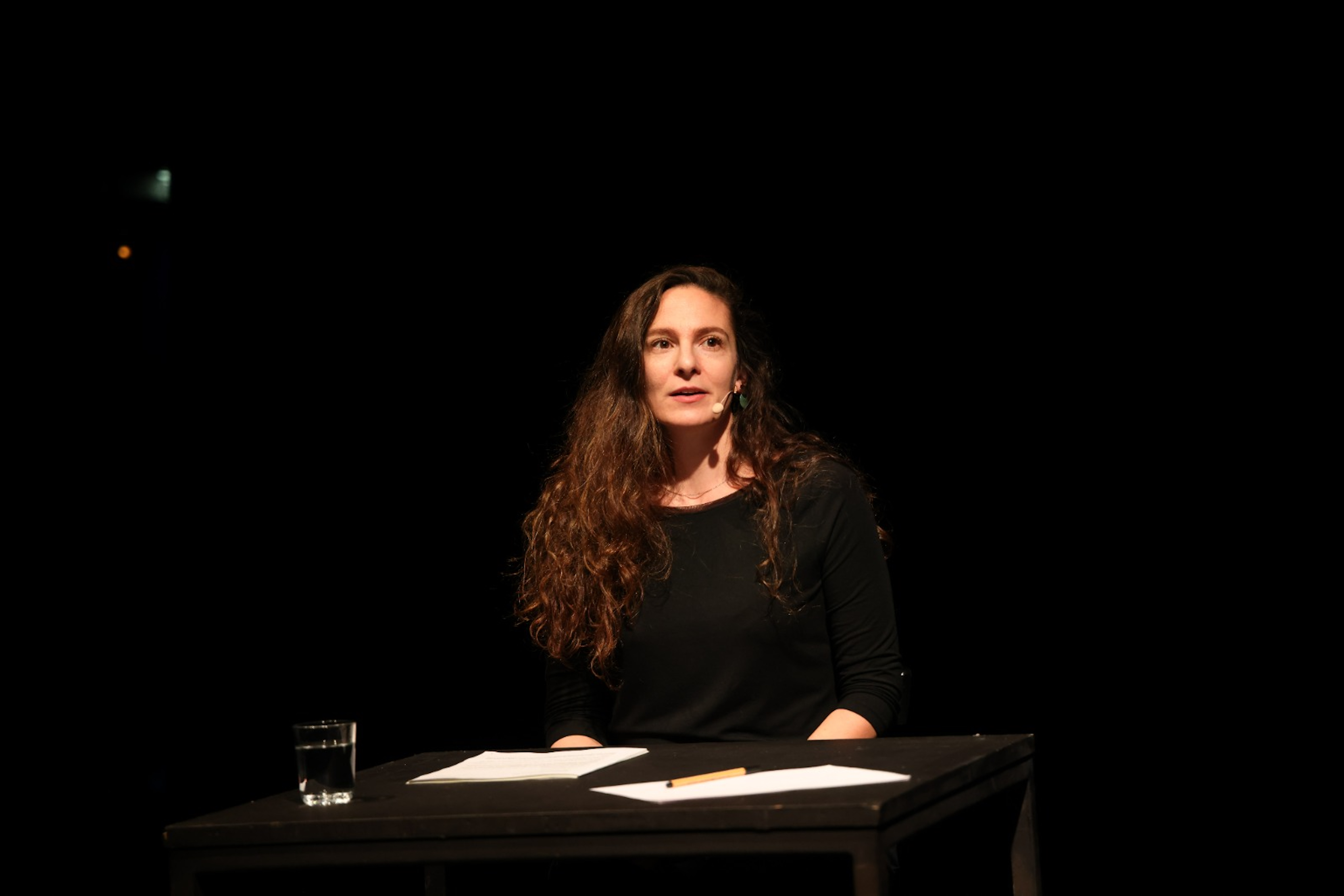 A still from the world premiere of "Secrets of the Infinite Sea," Nov. 16, 2022, at Theater Bremen. (Credit: Jörg Landsberg)
A still from the world premiere of "Secrets of the Infinite Sea," Nov. 16, 2022, at Theater Bremen. (Credit: Jörg Landsberg)
“All these cities — Beirut, Izmir, Marseille, Palermo — in the past, they were more important. Smyrna/Izmir was a big city until 1922 when it was burnt to the ground. All the minorities left the city and today it’s a relatively homogeneous landscape. The Greek community says the Turks burnt Smyrna. The Turks say it was the Greeks. It’s unclear who was responsible, but the fire changed the city forever.
“Most people don’t know that Izmir founded Marseille but lots of French people have said Marseille is not French. It’s multicultural. You can find Beirut in Marseille. You can find Tunis in Marseille. You can find Casa and Zagreb in Marseille. Marseille’s story with fire is a bit more natural. They say if you throw a cigarette during the Mistral, this strong northwesterly wind — it was blowing at 150 km per hour when we tried to shoot in Marseille — you may cause a fire. They have fires all summer long.
“The Mediterranean is all about fires. The government knows what’s going to happen every summer but the helicopters aren’t working, or they didn’t hire people to watch the data or maybe they set the fires themselves, because it creates real estate opportunities, right?”
Livers
A mischievous journalist might wonder if it brings any irony to the artist’s practice — being a lawyer in a country which is widely perceived to be lawless.
“That … is a hard question,” Abichahine glances into her doppio.
Into the pregnant pause that ensues, a she-cat strolls into the quiet room the café server has arranged for Abichahine. She regards the pair of humans and mews, disconsolate.
“I didn’t make a mission of criticizing or being ironic about the context I was born into, but it follows me,” Abichahine says. “I left Lebanon at 21. I lived, then I came back.
“As weird as it sounds, I feel good being an artist here today because I’m a witness. Being a witness is important in legal terms, but it’s important in artistic terms too ... I wouldn’t want to be away when the port explosion happened. I didn’t want to be away when the revolution happened. I do not want to be away while this economy of weird mathematics is happening.”
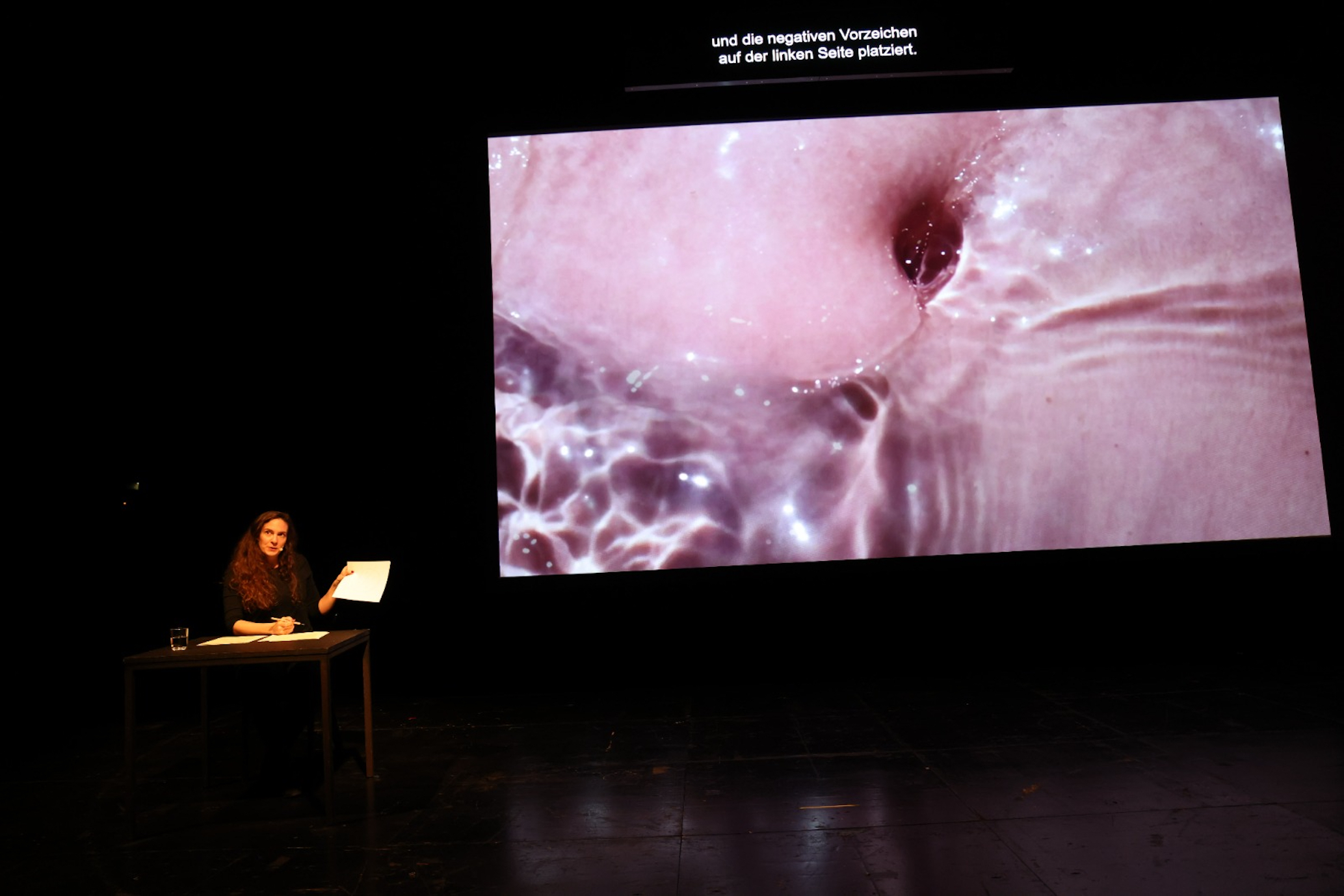 A still from the world premiere of "Secrets of the Infinite Sea," Nov. 16, 2022, at Theater Bremen. (Credit: Jörg Landsberg)
A still from the world premiere of "Secrets of the Infinite Sea," Nov. 16, 2022, at Theater Bremen. (Credit: Jörg Landsberg)
In return for introducing warmth and hot meals to humans, Zeus had Prometheus chained to a boulder where an eagle came to tear out his liver and devour it. The organ grew back overnight, so the cycle of agony could be repeated daily.
“The stories depict Prometheus as an alpha male, very strong, very accomplished,” Abichahine says. “I’m more interested in the punishment and the vulnerability. Who is this guy whose liver is eaten every night by the eagle, only to regenerate each day? Who is vulnerable this way today?”
“Livers,” Abichahine says. “I kind of fixate on the liver. I studied them from a biological point of view, from a historical point of view, in poetry. In Arabic poetry, we have lots of verses citing livers, then suddenly they have other meanings.
“I found animal livers that originated in Syria in the British Museum and a couple of Italian museums. I track the common beliefs from the Mediterranean and Mesopotamia … There was this amazing practice called haruspicy, [the oracular art of reading animals’ entrails] to read the future. It seems every time Julius Caesar went to war, a haruspex read an animal liver. This practice is forbidden to women.
“In ‘Secrets of the Infinite Sea’ my character is a kind of contemporary haruspex, sitting in Izmir and Marseille with these ancient Syrian livers, with real livers, trying to read the future of the Mediterranean.”
The cat has not ceased its mewing.
“She’s in pain.”
“Our Sea: Secrets of the Infinite Sea” will be performed at Marfa’ Projects on Thursday, March 30, at 7.30 p.m. sharp. Booking required: info@marfaprojects.com. The show is in English.
